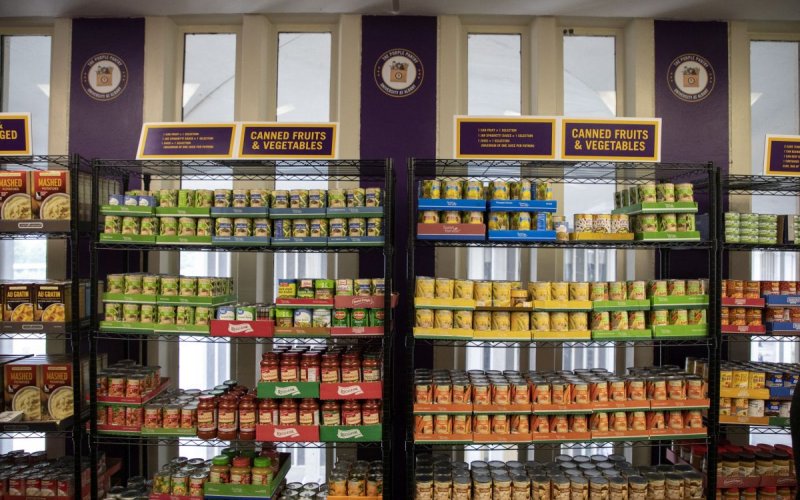UAlbany Contributes to New Report on Food Insecurity on Campus

ALBANY, N.Y. (March 30, 2021) – Drawing on the experience of students, faculty and administrators at the University at Albany and four other public urban universities, the Association of Public and Land-grant Universities (APLU) and Coalition of Urban Serving Universities (USU) released a report examining the COVID-19 pandemic’s impact on food insecurity on college students, and outlining steps institutions can take to better address food insecurity. The Kresge Foundation funded the project.
“No student should have to worry about where the next meal is coming from, or have to skip meals to make ends meet,” said Clarence McNeill, UAlbany’s dean of students. “In order for students to thrive in an academic setting, we must make sure their basic needs are being met, and that they know where they can go and who they can talk to if they are struggling.”
Participating universities – UAlbany, Morgan State University, the University of New Orleans, the University of Toledo and the University of Washington-Tacoma – conducted interviews, surveys and focus groups involving students, faculty and staff between March and December 2020 to get a sense of food insecurity and its implications. The results show students struggling to juggle work, school and finances, as well as the importance of mentors and nonjudgmental sources of aid.
At UAlbany, the Purple Pantry, a free on-campus source of food and toiletries for students, faculty and staff, is one such source. First opened in 2019, the food pantry has stayed busy during the pandemic with online ordering and contactless pickup. To ensure needs are met without stigma, there is no eligibility requirement beyond being a member of the UAlbany community.
Participating in the APLU Campus Food Insecurity Study was a great learning experience for our team, especially my very capable second year MSW field student, Jamilla Vanbuckley, who ran point on this project,” said Sally D’Alessandro, director of Student Care Services at UAlbany. “Jamilla led student focus groups that allowed us to not only gather information for the study, but to listen to our students’ opinions and ideas about how the pantry can best serve student needs."
The report found that students don’t perceive food insecurity as a permanent state, but an experience exacerbated at certain times by specific factors. “Students try to mitigate their food insecurity in many ways, which are often observed by the staff who have the closest relationships with students, such as advisors and student affairs staff,” the report states. “Students improvise, go without, or cut back on other necessities to address their food insecurity.”
A study by the Hope Center for College, Community and Justice found that 41 percent of college students at two- and four-year institutions experienced food insecurity within the preceding month. A separate survey by Northwestern Institute for Policy Research found Black and Latinx households reported experiencing food insecurity at higher rates than white households (41 percent and 37 percent, respectively; compared to 23 percent) during the pandemic.
The report provides several action steps to address the challenge, including:
- Increasing awareness about food insecurity on campus to destigmatize seeking help
- Elevating the historical and societal root causes of food insecurity
- Demystifying who the typical food insecure student is
- Assessing the impact of food insecurity on student success
- Partnering with community stakeholders to address the issue
- Advancing public policy alleviating the issue
“Far too many students spend each day wondering where they’ll find their next meal. It’s not hard to see that a student struggling with food insecurity is also a student who can’t focus as well on their studies,” said Christel Perkins, deputy executive director of USU and assistant vice president at APLU. “This report underlines the magnitude of the challenge and the urgency of addressing it. Building on insights from leading campuses, the report also outlines concrete steps institutions can take to better serve students’ basic needs.”
“We hope the stories and experiences students shared through this research inspire more universities to take action,” said Joselin Cisneros, education fellow at the Kresge Foundation. “It’s clear that many students, especially since COVID, are not able to nourish themselves in adequate ways. The nine targeted actions outlined in this report can encourage more institutions to be intentional about the ways they are responding to students’ holistic needs.”




